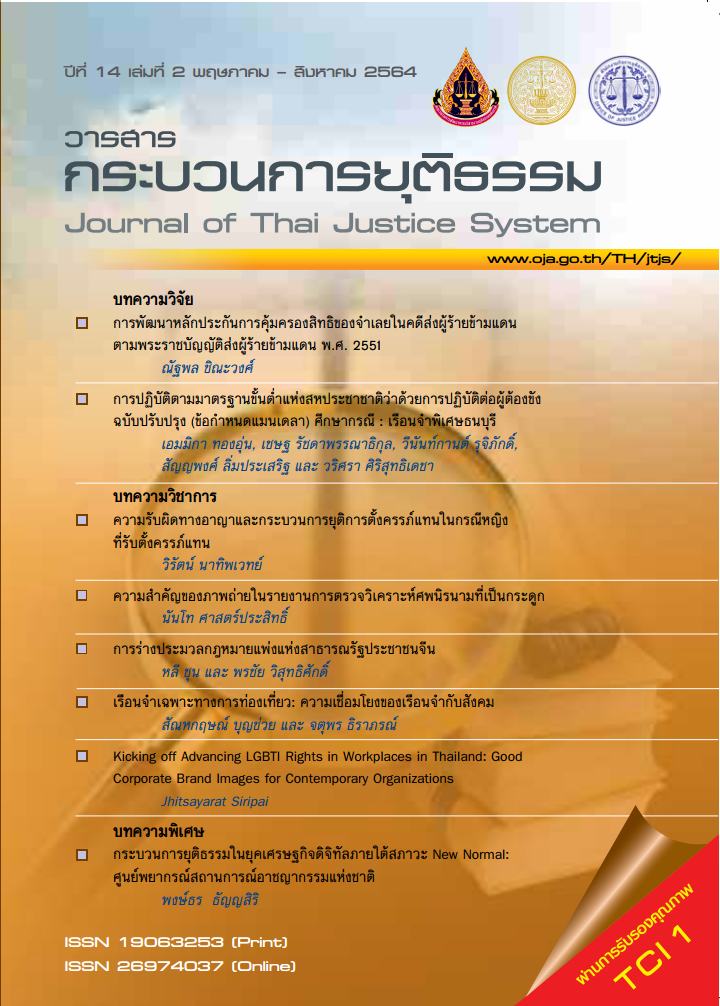ความรับผิดทางอาญาและกระบวนการยุติการตั้งครรภ์แทนในกรณีหญิงที่รับตั้งครรภ์แทน
Main Article Content
บทคัดย่อ
บทความวิชาการนี้มีวัตถุประสงค์เพื่อที่จะศึกษากฎหมายที่เกี่ยวข้องกับการยุติการตั้งครรภ์ของหญิง
ที่รับตั้งครรภ์แทน ได้แก่ ประมวลกฎหมายอาญา พระราชบัญญัติคุ้มครองเด็กที่เกิดโดยอาศัยเทคโนโลยี
ช่วยการเจริญพันธุ์ทางการแพทย์ พ.ศ. 2558 จากการศึกษาพบว่า การยุติการตั้งครรภ์แทนที่ฝ่าฝืน
ต่อพระราชบัญญัติคุ้มครองเด็กที่เกิดโดยอาศัยเทคโนโลยีช่วยการเจริญพันธุ์ทางการแพทย์ พ.ศ. 2558 มีความผิดตามประมวลกฎหมายอาญามาตรา 301 และพระราชบัญญัติดังกล่าวได้บัญญัติหลักเกณฑ์เกี่ยวกับการยุติ
การตั้งครรภ์ไว้ โดยมีการออกประกาศแพทยสภาที่ 95 (8)/2558 เรื่อง หลักเกณฑ์ วิธีการ และเงื่อนไขเกี่ยวกับ
การยุติการตั้งครรภ์แทนโดยมีเงื่อนไขว่า หากการตั้งครรภ์นั้นจะเป็นอันตรายแก่กายหรือจิตใจของหญิงที่รับตั้งครรภ์แทน หรือกรณีของทารกในครรภ์พิการซึ่งเป็นหลักเกณฑ์เดียวกับประมวลกฎหมายอาญามาตรา 305 (1) โดยแพทย์ที่ทำการยุติการตั้งครรภ์ไม่มีความรับผิดทางอาญา แต่จุดแตกต่างของกฎหมายดังกล่าวคือ กรณี การตั้งครรภ์แทนนั้นจะยุติการตั้งครรภ์ได้ต้องได้กระทำโดยผู้ประกอบวิชาชีพเวชกรรมและได้รับความยินยอม
เป็นหนังสือของบุคคลทั้งสองฝ่าย คือ สามีและภริยาที่ชอบด้วยกฎหมายที่ประสงค์จะให้มีการตั้งครรภ์แทน
กับหญิงที่รับตั้งครรภ์แทน ฝ่ายใดฝ่ายหนึ่งจะแสดงเจตนาโดยลำพังตนไม่ได้ ต่อมาได้มีคำวินิจฉัยศาลรัฐธรรมนูญที่ 4/2563 ได้มีคำวินิจฉัยที่ชัดเจนว่า บทบัญญัติประมวลกฎหมายอาญา มาตรา 301 กระทบต่อสิทธิและเสรีภาพ
ขั้นพื้นฐานในชีวิตและร่างกายของหญิงเกินความจำเป็น ไม่เป็นไปตามหลักความได้สัดส่วน และเป็นการจำกัดเสรีภาพ ตามรัฐธรรมนูญ พุทธศักราช 2560 มาตรา 28 ดังนั้น ประมวลกฎหมายอาญามาตรา 301 จึงขัดหรือแย้งต่อรัฐธรรมนูญ ทำให้บทบัญญัติมาตรา 301 ในส่วนที่ขัดหรือแย้งกับรัฐธรรมนูญนั้นใช้บังคับมิได้ และมีผลผูกพันทุกองค์กร ทำให้การยุติการครรภ์ของหญิงที่มีการตั้งครรภ์แทนไม่สามารถบังคับใช้บทลงโทษตามประมวลกฎหมายอาญาได้ ดังนั้น พระราชบัญญัติคุ้มครองเด็กที่เกิดโดยอาศัยเทคโนโลยีช่วยการเจริญพันธุ์ทางการแพทย์
พ.ศ. 2558 ควรจะมีบทบัญญัติที่มีโทษทางอาญาโดยเฉพาะเพื่อป้องปรามการกระทำที่ฝ่าฝืนต่อมาตรา 26
แห่งพระราชบัญญัตินี้ในภายหน้า
Article Details

อนุญาตภายใต้เงื่อนไข Creative Commons Attribution-NonCommercial-NoDerivatives 4.0 International License.
ต้นฉบับที่ได้รับการตีพิมพ์ในวารสาร เป็นลิขสิทธิ์ของวารสารกระบวนการยุติธรรม แต่ความคิดเห็นที่ปรากฏในเนื้อหาของบทความในวารสารกระบวนการยุติธรรม ถือเป็นความรับผิดชอบของผู้เขียนแต่เพียงผู้เดียว
เอกสารอ้างอิง
เกียรติขจร วัจนะสวัสดิ์. (2562). คำอธิบายกฎหมายอาญา ภาค 1 เล่ม 1 (พิมพ์ครั้งที่ 11). กรุงเทพฯ: กรุงสยามพับลิชชิ่ง.
เกรียงไกร เจริญธนาวัฒน์. (2547). หลักกฎหมายว่าด้วยสิทธิและเสรีภาพ. กรุงเทพฯ: วิญญูชน.
ไกรฤกษ์ เกษมสันต์. (2559). คำอธิบายประมวลกฎหมายอาญา ภาคความผิด มาตรา 288-มาตรา 366 (พิมพ์ครั้งที่ 10). กรุงเทพฯ: สำนักอบรมศึกษากฎหมายแห่งเนติบัณฑิตยสภา.
คณะกรรมการกลุ่มปรับปรุงชุดวิชากฎหมายอาญา 2: ภาคความผิด. (2561). เอกสารการสอนชุดวิชา หน่วยที่ 6- 10 กฎหมายอาญา 2: ภาคความผิด. นนทบุรี: สำนักพิมพ์มหาวิทยาลัยสุโขทัยธรรมาธิราช.
คณพล จันทร์หอม. (2561). คำอธิบายกฎหมายอาญา ภาคความผิด ลักษณะ 10 ความผิดเกี่ยวกับชีวิตและร่างกายลักษณะ 11 ความผิดเกี่ยวกับเสรีภาพและชื่อเสียง (พิมพ์ครั้งที่ 3). กรุงเทพฯ: วิญญูชน.
คณิต ณ นคร. (2545). กฎหมายอาญาภาคความผิด (พิมพ์ครั้งที่ 8). กรุงเทพฯ: วิญญูชน.
คณิต ณ นคร. (2547). กฎหมายอาญา ภาคทั่วไป (พิมพ์ครั้งที่ 2). กรุงเทพฯ: วิญญูชน.
จิตติ ติงศภัทิย์. (2553). คำอธิบายประมวลกฎหมายอาญา ภาค 2 ตอน 2 และภาค 3 (พิมพ์ครั้งที่ 7). กรุงเทพฯ: เพชรรุ่ง.
จุฑามาศ น้ำเงิน. (2559). ความรับผิดทางอาญากรณีรับตั้งครรภ์แทน. วิทยานิพนธ์นิติศาสตรมหาบัณฑิต. มหาวิทยาลัยธรรมศาสตร์.
ทวีเกียรติ มีนะกนิษฐ (2540). ผสมเทียม: ปัญหาการให้กำเนิดและการทำแท้ง. วารสารนิติศาสตร์, 25(2), 275.
ทวีเกียรติ มีนะกนิษฐ. (2562). ประมวลกฎหมายอาญา ฉบับอ้างอิง (พิมพ์ครั้งที่ 42). กรุงเทพฯ: วิญญูชน.
ธัญญาลักษณ์ พลชำนิ. (2561). มาตรการคุ้มครองหญิงที่รับตั้งครรภ์แทนตามพระราชบัญญัติคุ้มครองเด็กที่เกิดที่เกิดโดยเทคโนโลยีช่วยการเจริญพันทางการแพทย์ พ.ศ. 2558. วิทยานิพนธ์นิติศาสตรมหาบัณฑิต. มหาวิทยาลัยธรรมศาสตร์.
บรรเจิด สิงคเนติ. (2561). หลักกฎหมายมหาชน หลักนิติธรรม/นิติรัฐ ในฐานะ “เกณฑ์”จำกัดอำนาจรัฐ (พิมพ์ครั้งที่ 2). กรุงเทพฯ: วิญญูชน.
บรรเจิด สิงคเนติ. (2562). หลักพื้นฐานสิทธิเสรีภาพและศักดิ์ศรีความเป็นมนุษย์ (พิมพ์ครั้งที่ 6). กรุงเทพฯ: วิญญูชน.
บุญศรี มีวงศ์อุโฆษ. (2553). กฎหมายรัฐธรรมนูญ (พิมพ์ครั้งที่ 5). กรุงเทพฯ: มหาวิทยาลัยธรรมศาสตร์.
มาโนช สุทธิวาทนฤพุฒิ. (2548). ประมวลกฎหมายแพ่งและพาณิชย์ว่าด้วย ยืม ฝากทรัพย์ เก็บของในคลังสินค้าประนีประนอมยอมความ การพนันขันต่อ (พิมพ์ครั้งที่13). กรุงเทพฯ: สำนักพิมพ์มหาวิทยาลัยรามคำแหง.
มัรยัม แวหะยี และซาการียา หะมะ. (2560). ศึกษาเปรียบเทียบการทำแท้งในกฎหมายอาญาอิสลามและกฎหมาย อาญาไทย. วารสารอัล-นูร, 13(24), 170-171.
ลินดา ไชยธรรม. (2551). ปัญหาของการทำแท้งโดยชอบด้วยกฎหมายอันเกิดจากการตั้งครรภ์โดยการใช้ เทคโนโลยีช่วยการเจริญพันทางการแพทย์. สารนิพนธ์นิติศาสตรมหาบัณฑิต. มหาวิทยาลัยธรรมศาสตร์.
วิณัฎฐา แสงสุข และฐิติพร ลิ้มแหลมทอง. (2557). ความรู้เบื้องต้นเกี่ยวกับกฎหมายทั่วไป (พิมพ์ครั้งที่ 4). กรุงเทพฯ: สำนักพิมพ์มหาวิทยาลัยรามคำแหง.
สมคิด เลิศไพฑูรย์. (2548). กฎหมายรัฐธรรมนูญ หลักการใหม่ของรัฐธรรมนูญแห่งราชอาณาจักรไทย พุทธศักราช 2540. กรุงเทพฯ: สำนักพิมพ์มหาวิทยาลัยธรรมศาสตร์.
หยุด แสงอุทัย. (2556). กฎหมายอาญา ภาค 2-3 (พิมพ์ครั้งที่ 11). กรุงเทพฯ: สำนักพิมพ์ มหาวิทยาลัยธรรมศาสตร์.
หยุด แสงอุทัย. (2560). ความรู้เบื้องต้นเกี่ยวกับกฎหมายทั่วไป (พิมพ์ครั้งที่ 21). กรุงเทพฯ: สำนักพิมพ์มหาวิทยาลัยธรรมศาสตร์.
หยุด แสงอุทัย. (2561). คำอธิบายกฎหมายลักษณะอาญา ร.ศ. 127 (พิมพ์ครั้งที่ 7). กรุงเทพฯ: วิญญูชน.
อดิศักดิ์ ทองบุญ. (2560). ศึกษาวิเคราะห์จุดเริ่มต้นชีวิตมนุษย์ตามทรรศนะทางพระพุทธศาสนา. วารสารมหาจุฬาวิชาการ, 3(1), 32-34.
อุษณีย์ เมธสุทธิ. (2552). อำนาจทำแท้งตามกฎหมาย. วิทยานิพนธ์นิติศาสตรมหาบัณฑิต. มหาวิทยาลัยธรรมศาสตร์.


